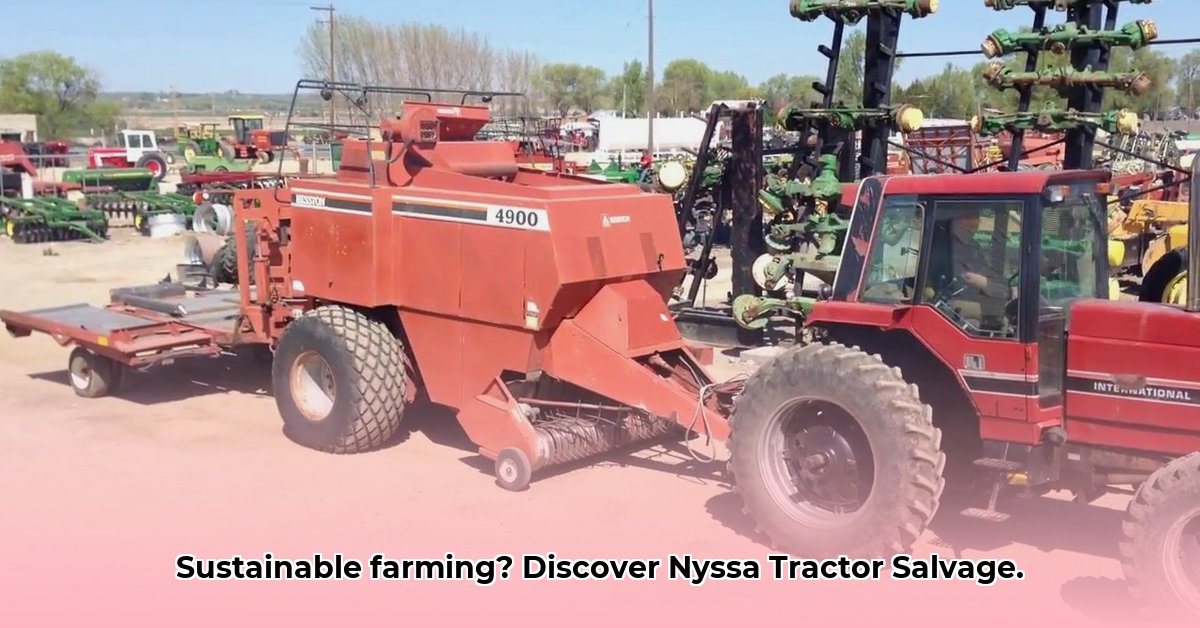
Nyssa Tractor Salvage is revolutionizing sustainable agriculture by repurposing used farm machinery, offering a cost-effective and environmentally conscious alternative to new equipment. This case study examines their unique business model, highlighting its successes, challenges, and potential for future growth within the increasingly important context of sustainable farming practices. For more on the value of older tractors, see this useful resource.
A Closer Look at Nyssa Tractor Salvage's Operations
Nyssa Tractor Salvage operates a unique salvage and parts resale business model within the agricultural equipment industry. Their process begins with the acquisition of damaged or end-of-life tractors and other farm equipment. These machines are then systematically dismantled, and each reusable part is meticulously cataloged and stored. This detailed inventory allows them to efficiently fulfill orders from farmers needing cost-effective repairs, acting as a specialized, large-scale parts supplier. Isn't it remarkable how such a straightforward process can have such a profound impact?
The company’s commitment extends far beyond simple repair. By extending the lifespan of existing machinery, Nyssa Tractor Salvage significantly reduces the demand for new manufacturing, contributing to lower carbon emissions and the conservation of natural resources. This circular economy approach minimizes waste and maximizes resource utilization; a model that shows how environmental responsibility can directly enhance a business's bottom line.
The Environmental and Economic Benefits
The environmental and economic benefits of Nyssa Tractor Salvage's operations are substantial. Their practices demonstrably reduce landfill waste, minimize the carbon footprint associated with new manufacturing, and lessen the dependence on virgin materials. Quantifying this impact would necessitate a detailed life cycle assessment, but the reduction in new manufacturing alone suggests a substantial environmental benefit.
Economically, the advantages for farmers are equally significant. Repairing equipment with salvaged parts often results in cost savings of up to 70% compared to new components— a critical factor for maintaining profitability in a challenging agricultural market. This cost-effectiveness makes sustainable practices accessible to a wider range of farmers, fostering a positive feedback loop between economic viability and environmental stewardship. How much more cost-effective could this initiative be with an improved online inventory system?
The Challenges of Salvaging Farm Equipment
Despite its advantages, Nyssa Tractor Salvage's model faces inherent limitations. The availability of specific parts frequently depends on current inventory, potentially leading to delays in repairs, especially for less-common components. While this model empowers farmers to repair existing equipment, it may not entirely satisfy those seeking completely functional, ready-to-use machinery immediately. This inherent limitation requires a strategic approach to inventory management to fully meet farmer needs.
Navigating the Competitive Landscape
Nyssa Tractor Salvage operates within a competitive agricultural equipment market characterized by both established dealers selling new machinery and other used equipment suppliers. The company's commitment to sustainability positions it favorably among environmentally conscious farmers, providing a key competitive advantage. However, the lack of "ready-to-use" equipment remains a constraint compared to those offering new machinery. This creates a crucial balance between immediate demand and the long-term benefits of sustainability.
SWOT Analysis: Strengths, Weaknesses, Opportunities, and Threats
Nyssa Tractor Salvage's competitive position can be analyzed through a SWOT framework:
- Strengths: Environmentally friendly approach, competitive pricing, high customer satisfaction.
- Weaknesses: Limited selection of ready-to-use equipment, dependence on the supply of used equipment, potential challenges sourcing specific parts.
- Opportunities: Collaborations with equipment dealers, development of online inventory management, expansion into equipment rebuilding services.
- Threats: Fluctuations in the supply of used equipment, increased environmental standards, growing competition.
Actionable Insights and Strategies for Success
Nyssa Tractor Salvage’s success hinges on strategic planning and adaptation. Key recommendations include improving the online inventory management system to enhance part searchability and increasing transparency around part quality and warranties. Partnerships with agricultural equipment dealers could create a mutually beneficial exchange of refurbished or salvaged parts versus new equipment.
Assessing the Risks and Mitigating Potential Challenges
Nyssa Tractor Salvage faces various risks, including part availability, salvaged part quality, market fluctuations, and competition. Effective mitigation strategies include diversified sourcing, robust quality control, strategic pricing, and proactive regulatory compliance. A comprehensive risk assessment matrix should be implemented to regularly monitor and manage these challenges.
Conclusion: A Sustainable Future in Farming
Nyssa Tractor Salvage's unique business model provides a compelling case study in sustainable agriculture. While challenges exist, their success underscores the potential for aligning environmental stewardship with business success. Continued innovation, strategic partnerships, and diligent risk management will be vital for Nyssa to maintain its momentum and contribute significantly to a more sustainable future for farming.
Further Research
Future research could explore the full environmental impact of Nyssa Tractor Salvage's operations through a comprehensive life cycle assessment. Studies comparing the long-term cost-effectiveness of using salvaged parts versus purchasing new components would further solidify the economic case for their model. Investigating the potential for scaling their business model to other regions and agricultural equipment types could also be valuable.